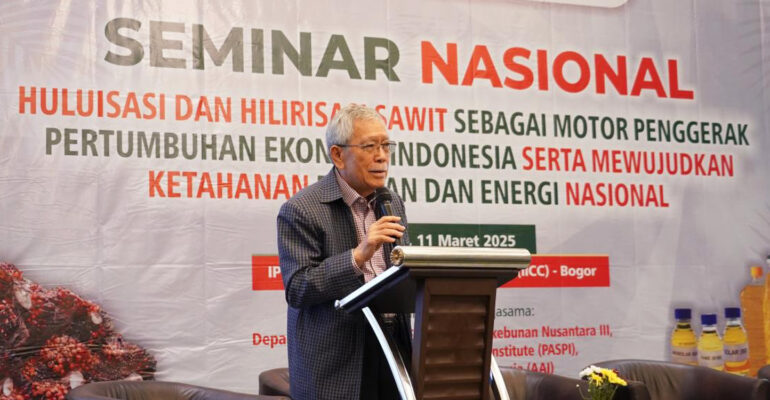IPB University Facilitates Scientific Dialogue to Uncover National Upstream and Downstream Palm Oil Strategy

The Agribusiness Department of IPB University facilitated a scientific dialog involving experts, practitioners, and policy makers. This was done through the “National Seminar: Upstream and Downstream Palm Oil as a Driver of Indonesia’s Economic Growth and Realizing National Food and Energy Security”.
In his speech, Prof Bayu Krisnamurthi, Professor of the Department of Agribusiness at IPB University, emphasized the importance of downstreaming as a strategic policy that has a broad impact on the national economy.
“Palm oil is a clear example of Indonesia’s successful industrialization in the agricultural sector. However, sustainability and increased productivity in the upstream sector are key for downstream to provide optimal benefits,” he said.
Rector of IPB University, Prof Arif Satria, highlighted the role of IPB University in encouraging technological innovations that have been adopted by the national palm oil industry. One of them is the use of satellite image-based mapping technology.
“IPB University has developed satellite image-based nutrient mapping technology that has been applied to 854.000 hectares of oil palm land. This technology increases fertilizer efficiency by 30 percent, strengthens the upstream sector, and supports more competitive downstream,” he explained.
In addition, he continued, IPB University also developed product innovations based on palm oil waste, such as bulletproof vests and clothing made from palm fiber that have been commercialized.
Prof Rachmat Pambudy, Minister of National Development Planning / National Development Planning Agency of the Republic of Indonesia (PPN / Bappenas) in his statement emphasized, that palm oil is a strategic commodity in the National Long-Term Development Plan (RPJPN) 2025-2045.
“Palm oil not only supports economic growth and national energy, but also becomes a leading commodity in encouraging the implementation of a circular and low-carbon economy,” said Prof Rachmat who is also a Professor of the Department of Agribusiness at IPB University.
This discussion also became a stage for IPB University to underline the urgency of upstream-downstream integration in the development of palm oil agribusiness. Prof Bayu emphasized, “Downstreaming without upstreaming will only produce inequality in added value. IPB University is ready to play an active role with research and policies that ensure the sustainability of the national palm oil agribusiness system.”
The seminar produced several important recommendations, including 1) acceleration of palm oil-based agricultural and bioenergy technology innovations; 2) strengthening the role of plasma farmers through strategic partnerships and the Indonesian Sustainable Palm Oil System (ISPO) certification program, 3) integration of IPB University research with industry needs to support sustainability-based downstreaming, and 4) institutional support for farmers in facing the challenges of forest area regulations.
Prof Bungaran Saragih, in closing, emphasized that IPB University has been a pioneer of the agribusiness system in Indonesia and will continue to contribute in building a globally competitive palm oil development model. (*/Rz) (IAAS/KDP)



